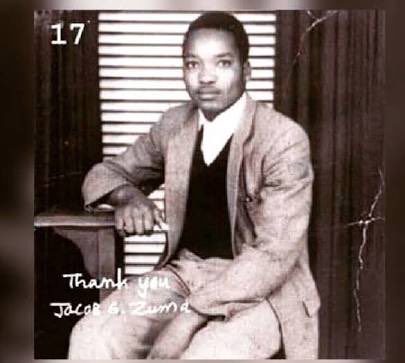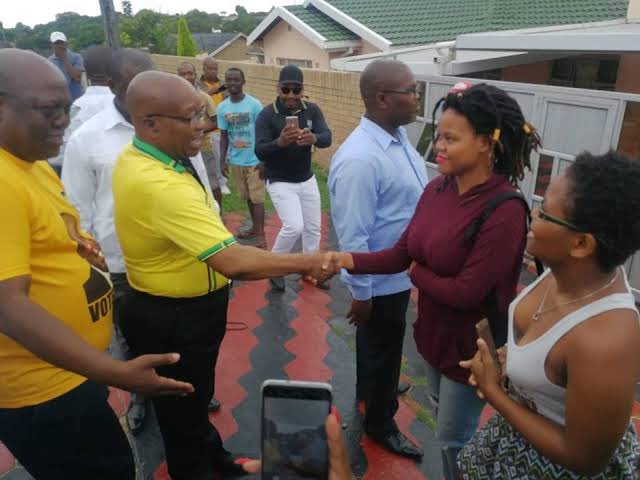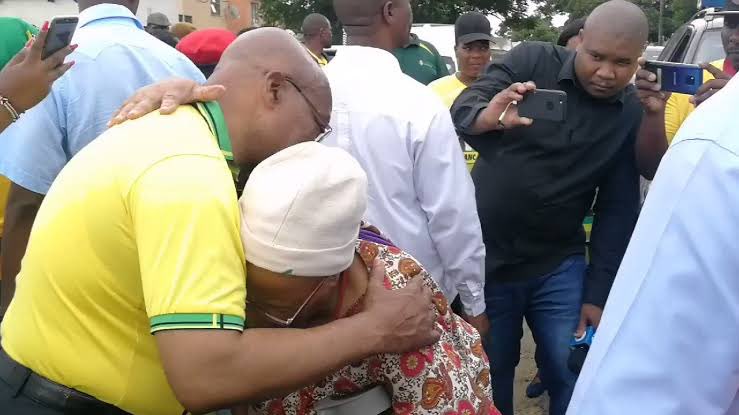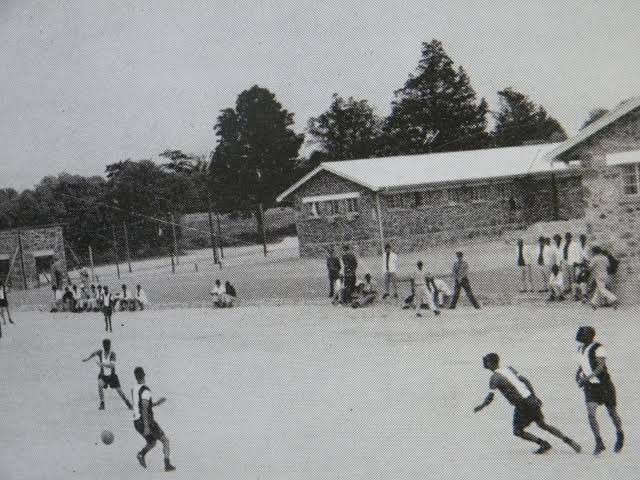On 12 April 1942 Jacob Gedleyihlekisa Zuma was born into the Zuma clan at Nkandla, the first son of Gcinamazwi Zuma and Nokubhekisisa. #ZumaDay
Zuma’s mother was a domestic worker. He remembers nothing of his policeman father, who died when he was about four. #ZumaDay
His mother had three sons with his father, Jacob is the eldest and his father’s first wife had four daughters and three sons. #ZumaDay
soon after her husband’s death, Zuma’s mother returned with her children to her parents’ home at KwaMaphumulo. #ZumaDay
“I was supposed to start school there, I was about seven or eight years old, but my grandfather, whose herdboy had gone off somewhere, asked that I take care of his cattle” #ZumaDay
He was supposed to find another herdboy, but he never did. So, although I was supposed to go to school, I couldn’t. That was it,’ said Zuma. #ZumaDay
“Later, my mother came to take me back to Nkandla – the family asked us to return – but there was no school at Nkandla. I was told to tend to the cattle and goats. And my mother went off to work as a domestic servant in the Durban area.” #ZumaDay
“...besides tending the cattle, we did many things. Nkandla looked much the same then as it does now, though there were more ploughed fields then.” #ZumaDay
“We also used to hunt animals with small knobkerries. We used to kill snakes. Actually, I was terrified of snakes – and I remember being told that the best way to deal with the fear was to kill even more of them.” #ZumaDay
He was a hero among his stick fighting peers because he used to beat the hell out of them. He had good tactics. Everybody among his peers respected him for that,’ said Mncikiselwa Shozi, who knew Zuma as a boy. #ZumaDay
“The media always report that I learned to read and write on Robben Island. Maybe they think it’s romantic.” #ZumaDay
“...And of course my literacy was improved there and, yes, Ibie Ebrahim who was in my cell used to lend me books, and Judson Kuzwayo, who was arrested with me, also used to assist.” #ZumaDay
“...But in fact I taught myself as a boy in Nkandla and later in the Cato Manor area of Durban where my mother was working.” #ZumaDay
Zuma said that he used to harass the other children who were attending school in the area and would come home at night or at weekends.
“I used to ask if I could look at their books and their slates. I really wanted to know what it was all about.” #ZumaDay
“I used to ask if I could look at their books and their slates. I really wanted to know what it was all about.” #ZumaDay
“Then I organised a kind of a night school. There was a woman in Nkandla, her name was Maria, and she had done standard four but was staying at home and not doing much of anything.” #ZumaDay
“I asked my uncles whether I could go to her for help after I had put the cattle back in the kraal in the evenings.
I remember the answer still – it came from either my mother or one of my
uncles: “If the cattle are at home and well, then, yes, do that.”” #ZumaDay
I remember the answer still – it came from either my mother or one of my
uncles: “If the cattle are at home and well, then, yes, do that.”” #ZumaDay
As Zuma moved into his teens, he would visit his mother more often. He wasn’t allowed to go to the home where she worked in Cato Manor, but he had a cousin living in the Greyville area and he would walk around the city and take whatever odd jobs came his way.” #ZumaDay
“I once went into a café in Umgeni Road. I used to wander around in those days in my bare feet. There was a particular sweet that I liked. And it was there on the counter so I picked it up...” #ZumaDay
“...but the owner thought I was taking it away from the white boy who was in front of me or maybe he thought I was stealing it, I don’t know. He gave me such a klap that I was reeling. I was so angry that I cried and cried. And I thought: “One day I’ll fix him.”” #ZumaDay
Zuma says that the first big influence on his awareness was the stories he heard as a child about Bhambatha’s rebellion. But he was especially influenced by his ‘father’s first son’, Muthukabongwa Zuma. #ZumaDay
“He had fought in the Second World War and he was a member of the ANC and he was a trade unionist. He preached endlessly about colonial oppression and the working class, and had an enormous influence on me.” #ZumaDay
“Thirdly, in the Cato Manor township, and in Greyville when I used to stay with my cousin, I used to see the ANC volunteers in their uniforms, and I used to go to ANC public meetings, and I listened and I learned.” #ZumaDay
“I used to visit my mother in Durban a lot, especially in winter, when there wasn’t so much work in Nkandla. But in those days it was not so much apartheid per se that worked on my mind – it was the overall and unrelenting oppression that Africans had faced.” ZumaDay
As a result of tensions over the municipal beer hall system, together with looming forced removals, Cato Manor township, where Zuma’s mother worked, exploded into riots.
In 1959, at the age of 17, Zuma joined the African National Congress. #ZumaDay
In 1959, at the age of 17, Zuma joined the African National Congress. #ZumaDay
Zuma had been a member of the ANC since 1959. Until 1961, however, when he joined MK, most of his activities were related to the South African Congress of Trade Unions (SACTU), the forerunner of Cosatu, run by the influential Moses Mabhida. #ZumaDay
Besides being influenced by his uncle at Nkandla, Zuma had also met a relation, Obed Zuma, who was known as a fiery trade unionist. SACTU was organising effectively in Durban in the late 1950s, and in 1959, the Cato Manor riots brought in 13 500 new members. #ZumaDay
Zuma and Joseph Mdluli (who was later to die in security police detention) comprised an underground cell at Bolton Hall in Durban. So far as MK activities went, Zuma does not seem to have been involved in any guerrilla activities besides the burning of sugar cane fields. #ZumaDay
Mathews Ngcobo an MK operative later imprisoned on Robben Island remembers meeting Zuma at Lakhani Chambers, a nondescript three-storey
building in downtown Durban, on the corner of Yusuf Dadoo and Saville streets. #ZumaDay
building in downtown Durban, on the corner of Yusuf Dadoo and Saville streets. #ZumaDay
Ngcobo was in his early twenties and Zuma 18 when they shared political
education classes on the third floor of the building. Ngcobo, Zuma, and about 28 others were tutored by Mabhida and another unionist, Steven Dlamini. #ZumaDay
education classes on the third floor of the building. Ngcobo, Zuma, and about 28 others were tutored by Mabhida and another unionist, Steven Dlamini. #ZumaDay
Ngcobo spent three years, from 1960 to 1963, attending classes there with Zuma. Recalling the years at Lakhani Chambers, Ngcobo said: ‘Zuma always asked questions and the questions he asked showed he was bright. #ZumaDay
Ngcobo says that Zuma’s fellow students were struck by his ability to learn. ‘He would always excel and go beyond the obvious when we were taught anything. He’s a problem solver. He always has time for people.’
#ZumaDay
#ZumaDay
Another person who remembered Zuma from Lakhani Chambers was Cletus Mzimela, who trained with Thabo Mbeki, Joe Slovo and Mabhida in the USSR and was on Robben Island for 15 years. #ZumaDay
In the 1960s he attended evening classes with Zuma. ‘He was a thin, handsome fellow.’ He recalls that Zuma worked in a kitchen, in a house somewhere off Musgrave Road. ‘He used to wear those white shorts and polish the floors and clean the windows.’ #ZumaDay
After Mandela’s 1962 trip through Africa, MK told its activists to leave South African secretly to undergo military training. One of those who had had a look around him, seen what was happening in the country, and decided that military training was the answer was Zuma. #ZumaDay
He arranged to ‘disappear’ for six months, hoping to return after a six-month military course. But he was also one who was caught. #ZumaDay
In July 1963, while Zuma was being held under the 90-day detention law at Hercules Police Station, disaster struck. The top leaders of the MK High Command was arrested in a security police swoop on Liliesleaf Farm in Rivonia, on the outskirts of Johannesburg. #ZumaDay
Zuma was part of a group of about 50 comrades who in June 1963, under the aegis of Umkhonto weSizwe (MK), were planning to cross the border into Bechuanaland (Botswana) and go to Lobatse. From there they aimed to head for Zambia for military training. #ZumaDay
But their plan to join the ‘Freedom Train’ out of South Africa had been revealed to the security police before it even started. #ZumaDay
“They nabbed us with ease because they knew about us.2 of our so-called leaders had sold us out. Besides that, serious torture by the police was relatively new then, people weren’t prepared for it, it was savage & many of the people in the group also gave away the game.” #ZumaDay
Zuma’s group was caught near Zeerust in the Groot Marico area. #ZumaDay
They had been travelling in five kombis back to Pretoria ‘to deliver some comrades’ when the police on the side of the road spotted them and realised they were part of a larger group about which they had been tipped off. #ZumaDay
Zuma found the 90 days of being held mostly in solitary, in Hercules Police Station, one of the most difficult times of his life – far more trying than his decade on Robben Island. #ZumaDay
On 12 August 1963, 21-year-old Zuma was sentenced to 10 years in jail for conspiring to overthrow the government. #ZumaDay
The register of prisoners on Robben Island contains the following listing: Prisoner 1/5268; name: Gedleyihlekisa Zuma; address: c/o Betty Zuma, b363, Cato Manor, Durban; date admitted: 63.12.30; date released: 73.12.29. #ZumaDay
For all of his 10 years on the Island, sharing a communal cell with between 30 & 50 men, washing in cold water, cut off from womankind, eating mealie-meal & boiled mealies three times a day, day in & day out, working in the lime quarries five days a week, and... #ZumaDay
...then having to strip to be searched, winter or summer, Jacob Zuma never received one visit. #ZumaDay
“My mother was a domestic servant. It would have been very expensive for her to travel from KZN to Cape Town, then to arrange to cross to the island & she would have seen me for 30 minutes. What was the point?” #ZumaDay
“I wrote to her to keep her money for the other children and that I would see her in due course.” #ZumaDay
The first time Zuma would see his mother again was in December 1973, in the Pietermaritzburg police cells, where he was held for two weeks before being driven back to Nkandla and released. #ZumaDay
Zuma’s group arrived on Robben Island before the ‘famous’ ones who had been sentenced to life imprisonment at the end of the Rivonia Trial, though Mandela had been there for a short time before. #ZumaDay
“Mandela and that group were given single cells, but the rest of us were put in communal cells and so I spent the next 10 years with Zuma, Steve Tshwete and Harry Gwala, among others” - Ebrahim ‘Ibie’ Ebrahim #ZumaDay

 Read on Twitter
Read on Twitter









